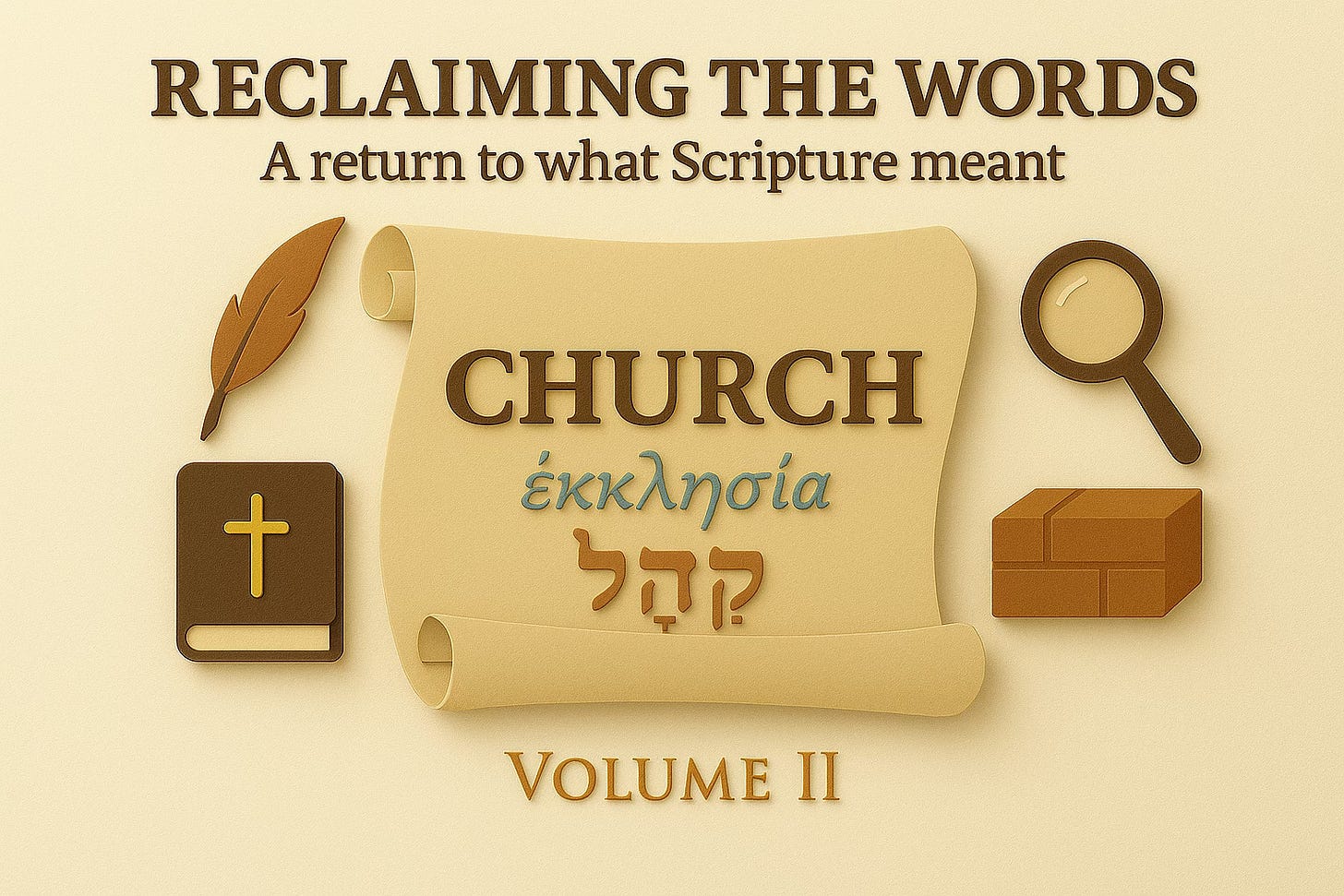Reclaiming the Words, Vol II: Church
What if ekklesia meant leaving empire behind—not building one in its place?
What Does Ekklesia Really Mean? How “Church” Replaced the Biblical Assembly
Volume II of Reclaiming the Words: Rediscovering the Sacred Language of Scripture
How the meaning of “church” drifted from Yeshua’s vision—and how we return to the original ekklesia.
About the Series: Reclaiming the Words
Language shapes belief. Over centuries, sacred biblical words—like believe, grace, church, and gospel—have been diluted or distorted.
In this weekly series, we return to the original Hebrew and Greek roots of key scriptural terms to uncover their covenantal depth and Kingdom meaning. These are the words that formed the ekklesia, the called-out community who followed Yeshua in truth and practice.
Vol II: The Misunderstood “Church” — How Ekklesia Became a Building Instead of a Body
“Upon this rock I will build My ekklesia, and the gates of Hades will not prevail against it.” — Matthew 16:18
In most English Bibles, the Greek word ekklesia is translated as “church.” But when Yeshua used this word, He wasn’t referring to a building, denomination, or religious institution.
He was pointing back to the qahal—a sacred, covenantal assembly of Yahweh’s people, rooted in Hebrew identity and Torah obedience.
The Hebrew Root of Ekklesia: Qahal (קָהָל)
The word qahal means “assembly” or “congregation.” It describes the collective people of Yahweh gathered by divine appointment:
Exodus 19:17: Israel gathers at Sinai to receive the covenant.
Deuteronomy 9:10: “The day of the assembly (yom ha-qahal).”
Psalm 22:22: “In the midst of the qahal, I will praise You.”
In the Septuagint, the Greek translation of the Hebrew Bible, qahal is consistently rendered as ekklesia. So when Yeshua said He would build His ekklesia, He was restoring, not reinventing, Israel’s covenant community.
Yeshua’s Declaration in Context: Ekklesia on the Rock of Revelation
In Matthew 16, after Peter confesses,
“You are the Messiah, the Son of the Living God,”
Yeshua responds:
“On this rock I will build My ekklesia.”
Yeshua likely spoke in Hebrew or Aramaic—qahal or kenishta (קְנִישְׁתָּא). His disciples, steeped in Torah, would have instantly thought of Mount Sinai, not cathedrals or denominations.
This time, though, the people wouldn’t gather around stone tablets—but around the Living Word, the Messiah Himself.
From Biblical Ekklesia to Institutional Church
Over the centuries, the word ekklesia was replaced. By the 4th century, under Constantine, it became known as:
Kuriakon doma — “The Lord’s house”
Old English: cirice
German: kirche
Modern English: church
This transition changed more than vocabulary. It shifted the focus:
The result? The ekklesia—a grassroots, relational, Spirit-empowered body—was replaced by a building-based, authority-centered system.
Yeshua’s Vision: A Covenant People, Not a Religious Program
Yeshua’s ekklesia was the restored qahal—a community:
Formed by covenant
Rooted in Torah
Fulfilled in Messiah
Empowered by the Spirit
Sent to embody justice, mercy, and truth
“You are a chosen race, a royal priesthood, a holy nation…” — 1 Peter 2:9, quoting Exodus 19:6
Even Stephen called Israel “the ekklesia in the wilderness.”
The idea that “the church began in Acts” ignores the long biblical continuity.
The ekklesia has always been Yahweh’s covenant people—now restored and reoriented around Yeshua.
Three Practical Applications
Rethink “Church” in Your Life
Don’t ask, “Where do I go to church?” Ask, “Who am I walking with in covenant community?”Decenter Buildings and Programs
Treat your table, home, and schedule as sacred spaces where the ekklesia lives and breathes.Rebuild the Hebraic Rhythm of Gathering
Let your assemblies reflect Scripture, shared meals, reverence, prayer, and mutual care—like the original qahal, fulfilled in Messiah.
Five Discussion Questions
What did Yeshua’s disciples likely hear when He said “ekklesia”?
How has “church” as an institution shaped your faith?
What historical forces replaced the biblical ekklesia with a religious structure?
How can we reclaim the Spirit-led, covenantal nature of the early gatherings?
In what ways does your current faith community reflect—or diverge from—Yeshua’s design?


